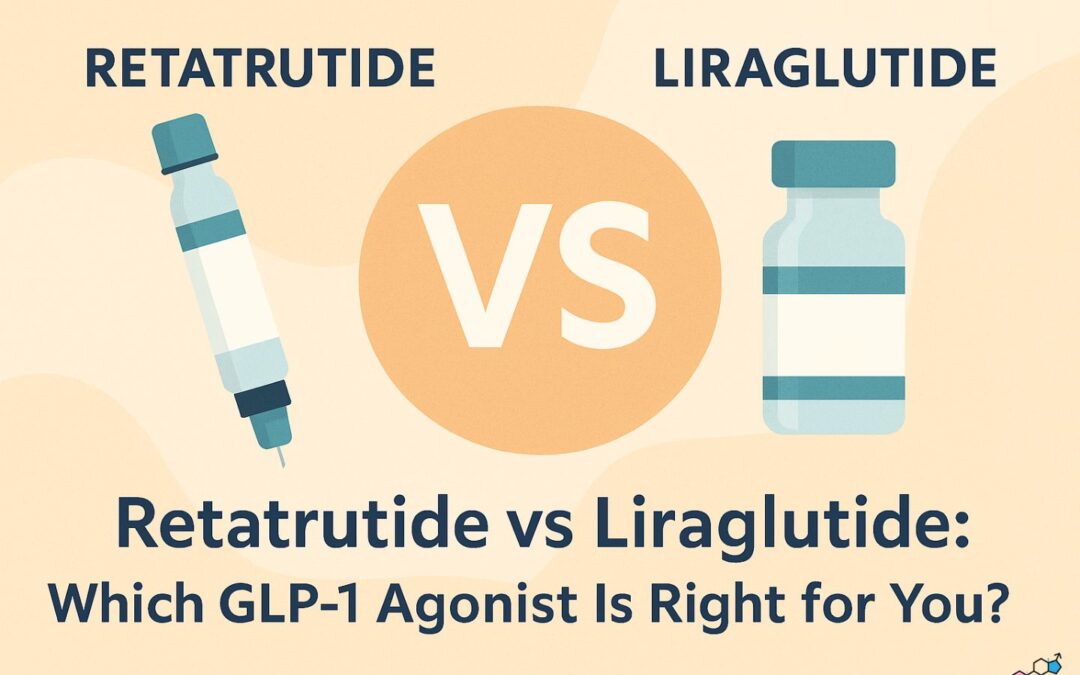If you’re thinking about using a GLP-1 medication to lose weight or manage blood sugar, you’ve probably heard about liraglutide. You may also be hearing a lot now about a newer option, retatrutide. Both are part of a group of treatments called GLP-1 receptor agonists. They help control hunger, improve blood sugar, and support weight loss.
But there are real differences between the two. Choosing the right one can depend on your health goals, current condition, and what your body responds to best. On this page, we’ll explain how each drug works, how they compare, and what you need to think about when deciding which one fits your needs.
How These Medications Work in Your Body
Liraglutide
Liraglutide is one of the first GLP-1 drugs used to treat type 2 diabetes and obesity. It works by copying a natural hormone your body makes after eating. This hormone helps your pancreas make more insulin when blood sugar is high. It also slows down how fast food leaves your stomach and helps your brain feel full faster.
You take liraglutide as a shot once a day. Most people use it under the skin of the stomach, thigh, or arm.
Retatrutide
Retatrutide is newer and not FDA-approved yet. But it’s showing big results in studies. It does more than just work on the GLP-1 receptor. It also works on two other hormones called GIP and glucagon. This combination seems to help people lose even more weight and improve their blood sugar at the same time.
The shot is taken once a week, which some people find easier than daily injections.

How Well Do They Work?
Weight Loss
Retatrutide has shown higher weight loss than liraglutide in early studies. People using retatrutide have lost up to 20% or more of their body weight. That’s close to the results seen with bariatric surgery.
With liraglutide, people usually lose around 5 to 10% of their body weight. That’s still meaningful and can lead to better blood pressure, lower cholesterol, and better blood sugar control.
Blood Sugar
Both drugs lower blood sugar in people with type 2 diabetes. Liraglutide has been used for many years and is proven to lower A1C by 1 to 1.5 percentage points on average.
Retatrutide also helps with blood sugar and might be more effective at bringing levels into the normal range. But since it’s newer, doctors are still collecting more long-term data.
Side Effects to Watch For
Like most GLP-1 medications, both drugs can cause stomach problems. These usually happen in the first few weeks and may include:
- Nausea
- Vomiting
- Diarrhea
- Constipation
- Feeling too full or bloated
These side effects tend to get better as your body gets used to the drug. Starting at a low dose and increasing slowly helps lower the chance of side effects.
There are also some rare but serious risks. Both medications should be avoided if you or someone in your family has ever had medullary thyroid cancer or a condition called MEN2. Talk to your provider if you’ve had pancreatitis before, as GLP-1 drugs might increase the risk.
Dosing and Convenience
Liraglutide is taken once a day. That means you have to remember to use it every day. Some people don’t mind this. Others find it hard to stick to daily shots.
Retatrutide is given once a week. This is simpler for many people and helps them stay on track. If you have a busy life or just want fewer injections, this may be a better option for you.
Which One Fits Your Needs?
Liraglutide Might Be Right for You If:
- You want a drug with a long safety history
- You prefer to start with something already FDA-approved
- Your doctor recommends a slower approach to weight loss
- You’re okay with a daily injection
Retatrutide Might Be Right for You If:
- You want stronger weight loss results
- You prefer a weekly shot over daily use
- You are open to a newer therapy with strong early results
- You want a treatment that may improve multiple health areas, including blood sugar, weight, and fat in the liver
Common Questions People Ask
Do I need to change my diet when using retatrutide or liraglutide?
Yes. These medications work best when used with healthy eating and physical activity. They help reduce hunger, but they won’t work well if you keep overeating processed foods or sugar.
Can I use retatrutide or liraglutide if I’m already on another medication?
Sometimes yes, sometimes no. These drugs can be used with insulin or metformin, but your doctor needs to check your full medication list to make sure it’s safe.
Are there any long-term risks in using liraglutide or retatrutide?
Liraglutide has been studied for over a decade and has shown heart benefits in some people. Retatrutide is newer, so we’ll know more as more people use it. So far, the side effects look similar to other GLP-1 drugs.
What happens if I stop using liraglutide or retatrutide?
If you stop taking the drug and don’t continue a healthy lifestyle, you might gain the weight back.
How Amazing Meds Can Help
At Amazing Meds, we make it easy to get started with peptide therapy, including GLP-1 medications like semaglutide. Our medical team helps you decide which option fits your life and health goals. We support you with:
- Lab testing
- A personalized treatment plan
- Ongoing check-ins
- Access to the latest therapies
- Adjustments to your dose based on your progress
We don’t just hand you a prescription. We walk with you through the full process and keep your results on track. Whether your goal is weight loss, blood sugar control, or both, we’ll find the right solution for your body and support you every step of the way.

Let’s Find What Works for You
Both liraglutide and retatrutide are powerful tools. They’re not the same, but each one can play a big role in helping you take control of your health. Choosing the right one is not just about numbers or trends. It’s about your needs, your body, and your goals.
If you’re ready to see what these types of therapies can do for you, Amazing Meds is ready to help. We’ll match you with the right therapy and make sure you feel good, safe, and supported from day one.

